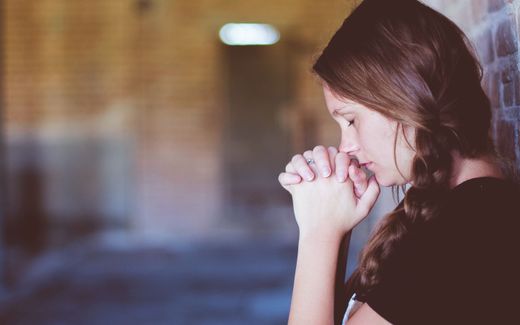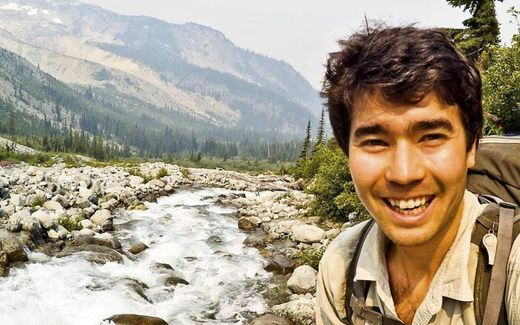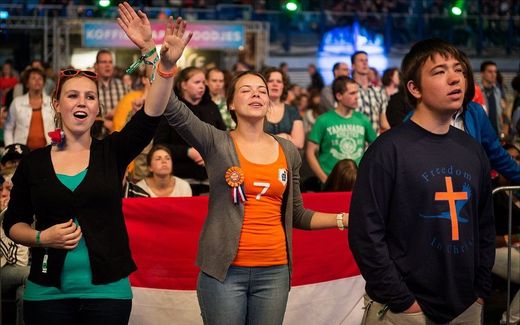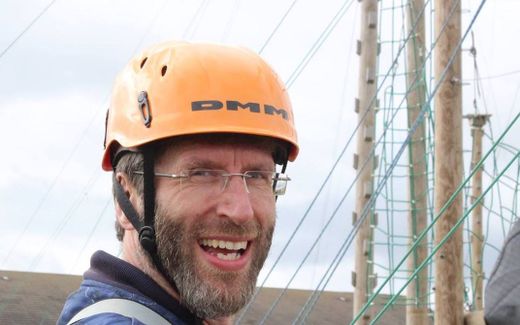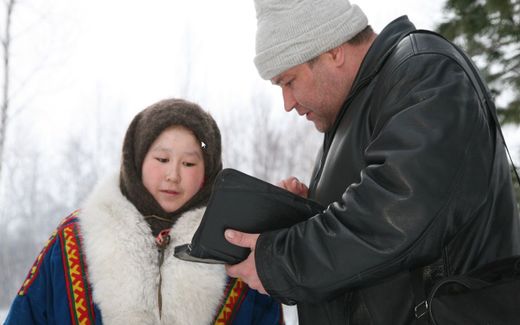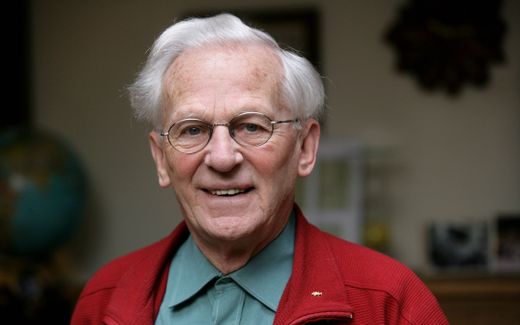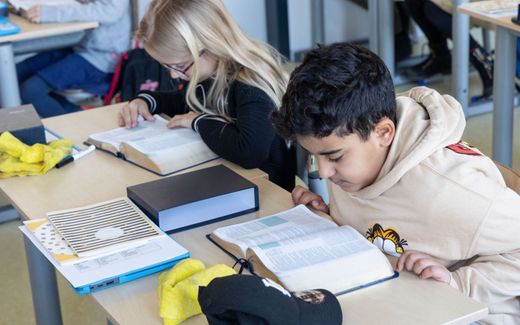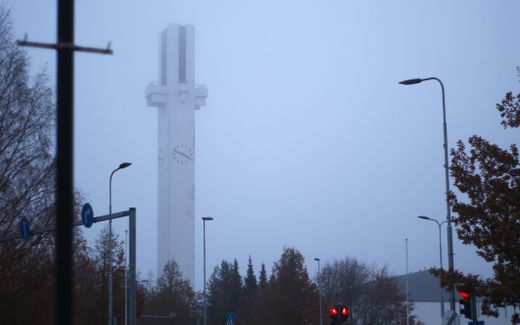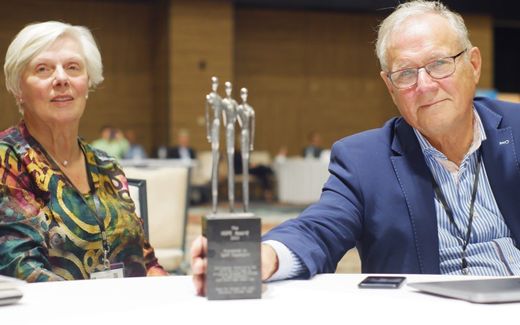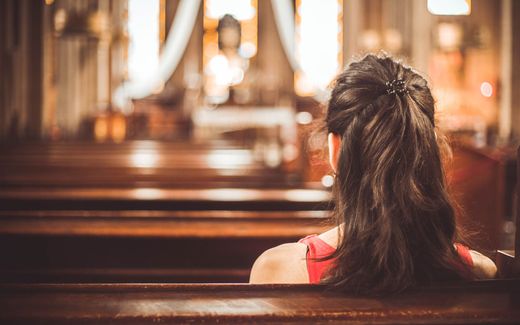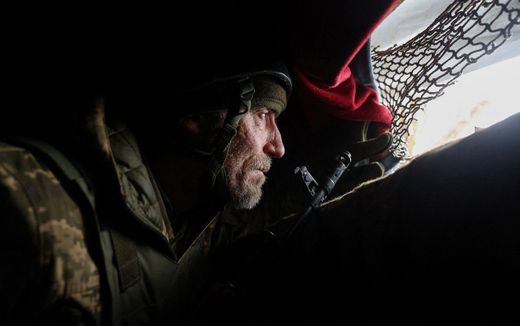Hannah would go into mission work, but died on a holiday
30-12-2023
Christian Life
Anne Lok-Vader, RD
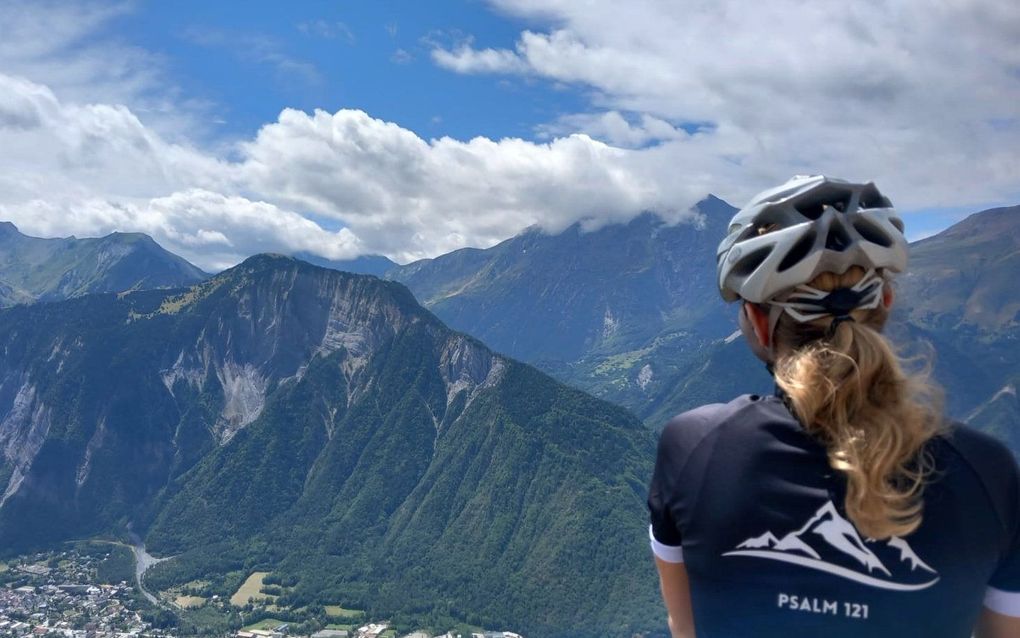
Photo Gertrude van Rijn
Christian Life
The Dutch Hannah Nijsse (24) wanted to go and preach the Gospel in a closed country. She was ready to go where God called her. This summer, she died while on a cycling holiday in the French Alps.
"Hannah was not primarily our child," says Jojanneke Nijsse. “First of all, she was God’s child.”
Together with her husband, Gert-Jan, she stands at the window of their home in the Dutch town of Bodegraven. They are looking at five frames on the windowsill. In the pictures, a cheerful, blonde twenty-something looks into the lens: curly hair, sweet smile, shining eyes.
The photo on the right was taken close to the Alpe d'Huez. It was Tuesday, August 8th, two days before the accident. Hannah's blonde hair waves out from under the bike helmet. She is wearing a shirt from Chadash, an organisation that organises cycling holidays and Bible study. "Psalm 121" is written on the back of the garment. It is as if the photo itself depicts this psalm.
Hannah lifted her eyes to the mountains, God's creation. Lifting her gaze over the valley where people live. People she cared for, who needed to hear the Gospel.
The mountains and the shirt had to be in the picture, she told Gertrude van Rijn, the tour guide who took the photo. She did not want to be recognisable in the photo because she wanted to use the photo for later.
Later. When she would be like in the mission, in a country where spreading the Gospel is strictly forbidden. Then, she would not be allowed to be depicted anywhere recognisable online because of security.
Hannah shared the picture in the family app. Her mother found it difficult to see the picture, as it confirmed Hannah's ideals. She had to go away from her family and familiar surroundings to serve in a distant and dangerous country.
Three weeks later, the picture was shown in the Village Church in Bodegraven, where people came together to mourn Hannah. She was no longer there.
"We are happy with all the photos we have," says Jojanneke. "And at the same time..." Her voice falters. "This is it then. There will be no more photos."
Help
Hannah was bubbly and full of life, her parents tell us. She had an eye for the people around her and knew exactly who needed help. As early as primary school, she took children home with her. They were struggling at home, for instance, because their mother was ill. Hannah lived intensely, absorbing everything that happened around her. A gift and a task because seeing everyone also makes you intensely tired. She struggled with it.

Hannah had a heart for nature. As a child, she took care of butterflies with a lame wing. She found snails, collected pebbles and preferred playing barefoot in the grass.
"Hannah was involved with God from an early age," says her father, Gert-Jan. "Better said, God was involved with Hannah early on." From an early age, she loved Him.
At Driestar College in Gouda, maths was her favourite subject. Hannah was intelligent and was often three steps ahead in her thinking. Her mind always needed challenges. So she chose Greek as an extra subject when she studied at All Nations Christian College, a missionary school in the English town of Ware, just above London. They had never experienced that there before.
For a long time, Hannah thought: I'm going into education. She did a bachelor's degree in engineering physics at the Technical University in the Dutch city of Delft. She then obtained a master's degree in biomedical engineering. For a moment she doubted: should I do theology alongside it? But she decided not to. "I can't do a bit of God alongside it," she thought. It was a full-time theology study or no theology at all.
Hannah graduated with a thesis on how MRI scans could be used in developing countries. In Delft, they were eager to keep her; she was allowed to do a PhD there. Hannah struggled with it: should I do this? I have been given these gifts; what does God ask of me now? She was blamed for declining the PhD position.
Instead, she opted for a gap year during which she attended a Bible college. In that year, the path would become clear to her, she expected. When she returned for leave after three months at All Nations, she already knew she would continue and prepare for a deployment. To work full-time in God's Kingdom.
Her desire to serve was also nurtured in Ethiopia. During and after her studies, she went to work for a few months at the Addis Alem Foundation, which provides aid and training to the poorest of the poor. There, Hannah gave training to Sunday school staff and created a module for children's work. Through a meal for the homeless, she met Solomon, who lived on the streets and was often drunk. Hannah taught him woodworking, giving him a purpose in his life. It touched the man that she did not turn her nose up at him despite the fact that he came from the streets and reeked of alcohol. He kept coming and became a different person. He now runs the workshop himself, where people come from the streets.
Closed country
Hannah knew that with her intelligence, she could be of service in a closed country where evangelisation is not allowed. There, thanks to her academic degree, she could enter quite easily as a 'tentmaker'. She could not say no because she knew she could be of great significance in that place.
Her parents realised you should be happy when your child enters the mission. But they also worried: how will they cope later, especially in a closed area? Letting go of your child is perhaps the hardest thing; they noticed even then.

There was one such difficult moment last March. Hannah was on leave and had brought a group of friends from All Nations. Wonderful, her parents thought, all these young people wanting to go out to preach the Gospel. But still. That pressing question also surfaced: What will it be like later?
A friend from Hong Kong pressed Jojanneke: "Hannah is not yours." She had said something similar to her own mother. Her words sounded harsh. But since then, she managed to let go of Hannah more and more. That was only possible because Someone else was holding her. "She was not first and foremost our child," Jojanneke says again. "She was first and foremost and above all a child of God."
Hannah herself also learned what letting go meant in those last months of her life. Earlier, she struggled with the question: where should I go? Which organisations am I going to approach? She wanted to plan, to have things in place organisationally. But became convinced that God would make the future clear. That peace made her relaxed and happy in the last few months.
Cycling
In 2018, Hannah joined a Chadash cycling trip for the first time. It became an annual highlight: a week of cycling in France and Bible study in the evening. "The average young person in the Netherlands has difficulty persevering and drops out in the face of adversity," explains pastor Martin van Oordt, founder of Chadash and Reformed minister in Delft. "In the mountains, people learn to persevere stubbornly – with others beside them. I always say: if you think you can't do any more, you're not even halfway there."
It is precisely because young people are physically busy together during the day that depth is created in the conversations, says Gertrude van Rijn, group supervisor. "If you get exhausted on the way up, you also dare to be vulnerable in a conversation about faith and say: sometimes I can't do it anymore. Young people share their questions and encourage each other."
Combining Bible study and sports – that was also how Hannah envisioned her work in missions. Through sport, she wanted to connect with people, especially in an area where talking about the Christian faith is forbidden.
The two trip leaders also kept in touch with Hannah throughout the year. At Gertrude's house, she did Bible study with a group of girls. And when she was studying in Delft, she sometimes visited pastor Van Oordt, who had previously been a minister in the village of Bodegraven. They discussed what occupied her, what she struggled with, and what bothered her.
Hannah enjoyed cycling. She had little trouble getting up the mountain. The tour guide especially saw her grow socially. In the early years, she sometimes avoided the hustle and bustle of the group. During meals, she sometimes literally retreated to her room. Talking and chatting about anything and everything she found difficult. She preferred to go straight into depth. But the Chadash holidays helped change that.
The day before the accident, Hannah told Rev Van Oordt what the trips had meant to her. For two hours, they sat by the lake at the foot of the camphouse. This summer was the sixth and last time she went along, she explained. Next year, she would either be deployed or go on a working holiday. It was as if she was taking some kind of accountability for it.
This summer, the letter to Philippians was the focus of Bible studies. Paul writes there how he is impelled by the desire to go and be with Christ, but at the same time, he sees that for the work in God's Kingdom, it is more necessary to continue to live. "Life for me is Christ; dying is gain."
The leadership struggled with it beforehand: how are we going to bring this message close to young people, who are all brimming with life? Their worries turned out to be unnecessary: Hannah told them during a Bible study that she so identified with Paul. Most of all, she would love to be with Jesus.
Mystery
Hannah is intensely enjoying her last trip. Every morning, she gets up an hour earlier. Then, she holds quiet time by the lake at the foot of the camphouse. On Thursday morning, August 3rd, she reads Romans 15. Verse 13, in particular, speaks to her: "Now may the God of hope fill you with all joy and peace in believing, that you may abound in hope, through the power of the Holy Spirit." She sends the text to friends at All Nations. She also sends a picture of where she is sitting, with the sun rising behind the mountains. The light is already shining on the peaks; the sun itself is still invisible. Hannah encourages the girls with a spiritual lesson she sees in it: sometimes you can't see God Himself yet, but you can already see what He is doing.
That afternoon, she cycles with part of the group in the mountains. It will be for the last time because the next morning, they will return to the Netherlands.
While descending, Hannah and a boy ride ahead of the others. He leads the way, Hannah a few dozen metres behind. Suddenly, he hears her calling. When he looks back, he sees that she is off balance. Only a long way down the road can he come to a stop and ride back. Hannah is nowhere to be seen. Strange, because they were not driving around a bend. The road is not super steep or narrow either, just two lanes wide, with a white stripe down the middle and no pebbles or other bumps. Cars are not driving there at that time.

The boy searches near the place where he last saw Hannah. Passers-by help, including firefighters who also speak reasonable English – unique in that region.
They find Hannah a bit beside the road in the bushes. How she got there remains a mystery. Hannah was cycling on the right but got caught on the left side of the road. Her brakes were working; she was wearing a helmet. She was not someone who took risks. A tree on the left side of the road was damaged. Presumably, she hit it in her fall.
When the tour guides arrive at the scene, Gertrude immediately scrambles down. Hannah is unconscious and breathing heavily but has no scrapes or torn clothing. Gertrude puts her arm around Hannah and tries to make contact. "God is with you. He is with you," she says. "You are not alone." She doesn't notice if Hannah hears her.
A trauma helicopter takes her to the hospital, but emergency workers cannot yet say which hospital. The tour guides leave their contact details with the police and agree to be called about it. Back at the camp house, they find a distressed group.
What they don't know then is that a terrible night awaits them. A night in which they wait in vain for a phone call as to where Hannah is.
Accident
In Bodegraven that Thursday, Hannah's parents are packing their suitcases for their holiday that is about to begin. When pastor Martin van Oordt calls about the accident, they don't hesitate for a moment. Fifteen minutes later, they are in the car, heading for the south of France.
But where to exactly? Grenoble is nearby, so it seems to be the most logical destination for the helicopter. From the car, they contact the insurance company. However, after some phone calls around, they learn that Hannah is not in Grenoble. Panic sets in. Where is their daughter? "So she could have already died without anyone knowing?!" shouts Jojanneke through the phone. "Yes, it is possible," confirms the voice on the other end of the line.
On the way to Grenoble, the parents drive past Lyon, the nearest big city. If Hannah is not in Grenoble, the trauma helicopter may have diverted to a nearby hospital. Lyon then seems the most plausible. They take the exit, enter a random hospital and wander the dark corridors, looking for help. At the emergency room, they find a willing lady. Hannah is not here, she reports. The woman calls other hospitals in Lyon, but Hannah is not there either.
Her parents are at their wit's end. They had been driving all night, and now no one could tell them where to find their daughter. And whether she is still alive.
The lady in Lyon is eager to help them and makes another call to all the hospitals in Grenoble. She tells them approximately what time Hannah was brought in and what injuries she might have. Then, it turns out she is registered in Grenoble with the wrong surname: Njisse. French people don't know the ij-sound (as “eye” in English).
Around six-thirty, her parents arrive in Grenoble. Their daughter is in an artificial coma, a doctor tells them. "Keep in mind that she could die. Maybe as early as today." According to the doctor, the brain damage makes it clear that Hannah is in very bad shape. "The next few hours could be decisive. And the next three to five days are very risky. If she gets through that, we want to try to bring her out of a coma after two weeks. And then it remains to be seen whether she can live with the brain damage we are already seeing." There are two options: either Hannah dies, or she is disabled for life.
The parents run after the man. They see their daughter lying in a bed. A Hannah who is so different from what they know. So vulnerable and quiet. And today, she could die.
For a moment, there is panic. The parents leave the room to inform the tour guide and family. When they return to the bedside, it seems like a different Hannah is lying there. A Hannah resting in God's Father's hand. And they know that God is good. He is with her. With Him, she is safe. They know, to this day, Hannah is not primarily their child. She belongs to God. And He cares for her.
Lodge
Chadash's camp house becomes Gert-Jan and Jojanneke's lodge. The first days, they are there with Martin and Gertrude, later with their children and close family. Together, they stand around Hannah. Together they kneel at her bed. Together, they place her in God's hand: it is up to Him. Her parents have to let her go. Literally, too: after a few days, they are no longer allowed to touch their daughter because it can be disruptive to brain pressure.

Meanwhile, prayers rise up from all over the world for a miracle. In Bodegraven, Christians from several churches are holding prayer meetings. People from all over the country respond to prayer calls, often without knowing Hannah. Mission workers and students from All Nations in many countries pray 24 hours a day through Zoom meetings. Family and friends in Israel, Ethiopia, and other places are begging God for a miracle. How wonderful it would be if He answered those prayers, people say if Hannah heals and can still enter the mission.
Meanwhile, the medical team in France is fighting for Hannah's life. But each time, her brain is cut off from oxygen for too long. They can't get it under control.
On Wednesday, the doctor says: "We have to let her go."
Just before Hannah dies, the parents stand by her bedside one last time. Although their daughter is unlikely to hear anything, they tell her anyway: "Hannah, God is good. He is holding you. With Him, you are safe. He will bring you home." They know she is ready to die and tell her that heaven awaits her, where there will be no more pain.
For her parents, it is as if they are standing at heaven's gate. A gate through which Hannah will enter real life. Yes, she will live. More than the living around her bed.
When Hannah is brought home, the gate closes. Her loved ones must return. Back into the world. A new world without Hannah.
It is impossible. It is possible with God.
Scratch
Thursday morning, the news arrives: Hannah has died. Her brain is damaged, and her jaw and cervical vertebra are broken, but the rest of her body does not have a scratch. Hannah gladly made available what she had been given by her Creator to those around her. Her parents are convinced that the same applies to her body. Therefore, they boldly consent to organ donation.
Two weeks later, in the funeral service, Rev Van Oordt preached on Philippians 1, the book of the Bible that the cyclists in France were pondering. About Paul, who longed to be with Jesus but also saw how necessary it was to continue serving God on earth. "Life for me is Christ, dying is gain," he said.
The message of the Gospel must continue, says the preacher. "What now that Hannah has fallen away? Which of you, which of you, obey the call to walk worthy of the Gospel of Jesus Christ?" He quotes Isaiah's call, which he spoke to Hannah about. "Who shall I send? Who shall go before us? Hannah said, See, here I am. Send Me." He looks into the church. "Who will take over her answer?"
"God must have given us all incredible strength," Hannah's parents say to each other as they look back at the service later. "How else could we have done this? How could we have sung "How Great Thou Art" there? How could Martin have preached there?"
They believe this God has answered prayers for a miracle. By now, they cannot count on two hands the stories of people changed by the death of their daughter. People have woken up, come to faith, and started living with God again. Take the young person who thought he could handle life on his own. This death made him realise: I won't get there in my own strength. He marvelled at the joy he saw, alongside the grief, in Hannah's parents. Now, he goes his way in dependence on God.
Take the adolescent from England who grew up in an almost unbelieving family. When she heard about Hannah's faith, it touched her heart.
Take the woman who struggled with the cruelty of misfortune. Where was God on that mountain? If it has to be that way, let it be, she thought. But when she heard God's Word at the funeral, those hard thoughts no longer held.
Take the girl who had little left to do with faith. When she saw people praying for Hannah to live, and she didn't, she only became more cynical. "I told you, you don't need to go to God. It's no use to you." She watched the service online and could no longer insist that God does not hear. "Now I know He is God, and He is indeed present," she said.
It amazes Gert-Jan and Jojanneke when they hear how God continues His work. The devil has lost it on all sides, they see." He wanted to use this dying to undermine Chadash's work, to make cynical people even more cynical, to deprive us of faith. It didn't happen, on the contrary. God's work continues vigorously." At times, it lifts them above their grief. Hannah longed to reach many with the joyful message of the Gospel. It happened miraculously and so differently than imagined." Her life was richly blessed; her dying at least as much," says her mother.
Thanksgiving
Gert-Jan and Jojanneke prayed every night for their three children: Marjolein, Hannah, and Tim. Not mentioning Hannah's name again was an impossible thing. Even though they no longer needed to because she has everything. So now they give thanks for Hannah every night. She is safe with God and may have it so good with Him. For who Hannah has been and for the miracles God has done in people's hearts after she died. Then, they also pray whether God will continue to work. Whether He continues to give them strength to bear the grief.
People tell them they have sometimes thought: What would it be like if something happened to my child? What if I stand at my child's deathbed?" Just stop thinking," they then reply. "It's much worse than you can imagine. There is no playbook for it, either. But know: when it happens, you get the power."
Other people asked them why Hannah, of all people, had to die. Surely, she wanted to serve in God's kingdom? Her parents have those questions, too. But they don't need answers. "Because we know God was there. He sometimes goes on crooked roads. Roads that we think: this is going wrong. But we can firmly believe that His way is right. God really does know what He is doing. And He is good. Apparently, Hannah's task on earth was finished."
There are days when the parents can't take it anymore with grief. Then they think of the song "Always Good", which Hannah sent to friends on the morning of the accident.
Darkness may deepen
And shadows may fall
But you will be faithful and true
There is no end to your mercy
And your love will not run dry.
Sometimes they wonder: how can we live, perhaps for another 30 years, with this grief?" Impossible. But when we fix our eyes on Jesus, the intense sorrow fades away. God gives strength for today. Or for this hour. In the past months, there was not a moment when He left us alone. Therefore, we need not fear for tomorrow. He remains the same."
This article was translated by CNE.news and previously published by the Dutch Christian daily Reformatorisch Dagblad on December 30th, 2023.
Related Articles

